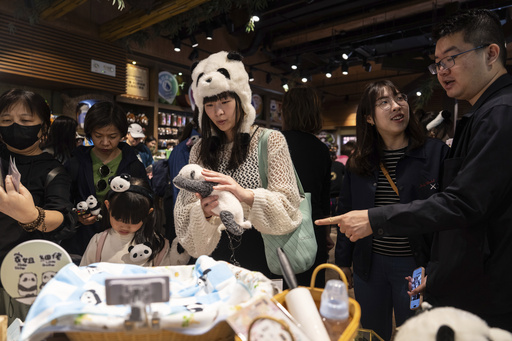
HONG KONG — The excitement surrounding giant pandas has returned to Hong Kong as locals enthusiastically engage in a contest to name the territory’s first giant panda cubs born in captivity. The adorable twins recently celebrated their six-month milestone, having arrived on August 15.
On Saturday, a naming competition was announced during a festive ceremony at Ocean Park, attended by Hong Kong’s leader, John Lee, along with several other officials. This theme park serves as the home for the panda twins, their parents, and two additional pandas that were brought in from mainland China last year. Residents are invited to share their name suggestions through the park’s official website.
Lee pointed out that Hong Kong now boasts the largest population of pandas held in captivity outside of mainland China. He revealed that the chosen names for the cubs will be unveiled within the first half of this year. Currently, the twins are referred to as the “Elder Sister” and the “Little Brother.” Starting Sunday, they will be available for public viewing for five hours each day. Visitors can even enjoy private time with the cubs during non-public hours for a fee of 1,500 Hong Kong dollars, roughly equivalent to $190.
During a media preview on Saturday, the male cub was seen playfully swinging on a tree branch and exploring his surroundings with a stick before being assisted down a slide by a caretaker. Meanwhile, the female cub displayed her curiosity about the enclosure by climbing trees. The panda caregivers noted that she appears to have a livelier personality compared to her brother, who prefers to roam and engage with the foliage. A notable feature distinguishing the male cub is the presence of two purple food-coloring marks on his back, allowing for easy identification.
Significantly, the birth of these cubs last year has made their mother, Ying Ying, the oldest panda to become a mother for the first time globally. Their endearing presence has captured the hearts of many on social media, fueling expectations for a resurgence in tourism. Officials are motivating local businesses to leverage this panda fever and tap into what some lawmakers have referred to as the “panda economy.”
Ocean Park’s chairman, Paulo Pong, shared that the park experienced a boost in income during the Christmas season and Lunar New Year holiday. This upturn coincided with the public opening of the pandas that had arrived from mainland China, attracting increased attention from overseas visitors. “We’re turning a new leaf, and we sincerely believe that the pandas are playing a significant role in enhancing the park’s revenue,” he remarked.
However, maintaining pandas in captivity comes with substantial costs. The park reported a financial deficit of 71.6 million Hong Kong dollars (approximately $9.2 million) last year and had previously required government assistance in 2020 to remain viable. As observers anticipate the challenges of caring for six pandas, there is interest in whether this will impose further financial strain or provide an opportunity for revitalization.
Pong emphasized that the focus of panda care extends beyond just revenue generation, highlighting that it centers around conservation and education. Pandas, often viewed as an unofficial national symbol of China, are also key players in the country’s soft-power diplomacy, chiefly through its giant panda loan programs to zoos worldwide.

